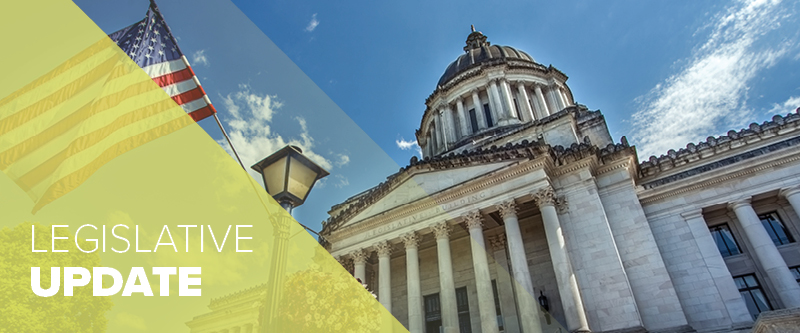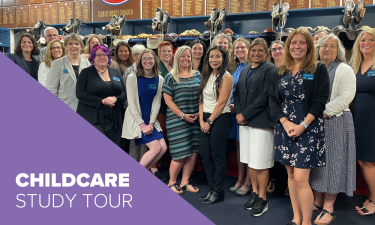With Jim Hedrick, WA State Lobbyist and Spokane Regional Advocate

Welcome to week four of the 2022 legislative session. Read more below about the advocacy issues we’re part of and check out our 2022 State Agenda, or get caught up with updates from weeks two and three. For more information contact Jake Mayson, Director of Public Policy.
The Thursday, February 3rd deadline for bills to pass the house of origin policy committee has now passed and the list of “live bills” has narrowed. Key high-profile bills are still advancing, including HB 1868 (nurse staffing), HB 1850 (data privacy), HB 1837 (ergonomics), SB 5568 (armed intimidation local preemption), SB 5532 (prescription drug affordability board) SB 5600 & SB 5764 (apprenticeships), SB 5891 (warehouse regulations), HB 1705 (ghost guns), SB 5843 (false statements), HB 1630 (open carry at school board meetings, election sites, and local government buildings), HB 1617 (Juneteenth school holiday), and 5909 (emergency powers). The next deadline, for bills with a fiscal implication to be voted out fiscal committee, passed on Monday, February 7.
On Monday, January 31, the House Finance Committee heard HB 2018 (Paul, D-10), a bill creating a one-time sales tax holiday on certain items less than $1,000 over the 2022 Labor Day Weekend. According to the fiscal note, the bill is estimated to cost the state approximately $120 million. Another $52 million would go to lost local government revenue. While the Washington Retail Association applauded the bill, it was opposed by the labor community who voiced concerns about taking money from the general fund. It was also opposed by the Economic Opportunity Institute for being a distraction from large-scale tax reform. The bill has not yet been scheduled for executive action, but could be considered necessary to implement the budget, thus allowing the idea to live until Sine Die. Rep. Paul, the only Democrat in the 10th delegation, will surely face a tough re-election this year, though no Republicans have filed yet. In 2018, he won his seat by 685 votes. And in 2020, he won by 738 votes.
House Labor & Workplace Standards Chair Representative Mike Sells (D-38) announced this week that he will not seek re-election. Sells has represented the 38th district for 17 years. Representative Liz Berry (D-36) is rumored to be vying to be the next chair of the powerful labor committee, a position Sells held for 10 years.
Berry is delving deep into labor issues with HB 2076, a bill that seeks to regulate gig economy giants like Lyft and Uber. The bill, a product of negotiations between Uber, Lyft, and the Teamsters, was voted out Wednesday, February 2 in House Labor & Workplace Standards. Among other elements, HB 2076 would create a statewide regulatory framework and require paid sick leave and family and medical leave for drivers, implement a minimum compensation for drivers, and create a 15-cent charge per ride to pay for a Driver Resource Center fund to help drivers who get deactivated by the companies. In the background for these negotiations, Lyft, Uber, Doordash, and Instacart have formed the Washington Coalition for Independent Work, a ballot measure committee holding more than $2 million. If negotiations in the legislature fail, the companies could go to voters to pre-empt state and local regulation, something they did in California in 2020. There the companies spent $220 million to strike down a state law that defined their drivers as employees rather than independent contractors. A similar measure is headed to the ballot in Massachusetts. The bill has been referred to the House Transportation Committee.
In 2021, the legislature passed, and the governor signed into law E2SHB 1310. In part, that hugely significant legislation created a standard for the use of force by peace officers. This week, the Senate Law & Justice heard and voted out another proposed revision to this law. The hearing and vote were not on the original SB 5919 (Van De Wege, D-24), but on Chair Dhingra’s striker. In the striker, definitions relating to the use of force are amended, the situations where a peace officer may use physical force are expanded, and the standard for reasonable care is amended. The striker is supported by several mayors across the state as well as law enforcement organizations but is opposed by families of those who died during interactions with police. HB 2037 (Goodman, D-45) also saw a vote this week in the House Public Safety Committee, addressing many of the same issues. Both bills have been referred to their respective Rules Committees.
On Wednesday, February 2, the House voted nearly unanimously on HB 2019 (Boehnke, R-8), a bill that will help to establish career pathways for retail workers. Under the legislation, the Workforce Board, in consultation with the State Board for Community and Technical Colleges (SBCTC) must consult and engage with stakeholders to identify and make recommendations on strategies to increase education and training for retail workers. The retail industry accounts for 42% of the state’s revenue and is collectively the third-largest employer in the state. The bill now goes to the House for further consideration.
This week, SB 5697 (Das, D-47) received executive action in the Senate Environment, Energy & Technology Committee, but died Friday in Ways & Means. According to the sponsor, the legislation “would shift the cost of recycling from ratepayers to producers.” The bill, also known as the RENEW Act, would have established a program for the management of consumer packaging and paper products to be funded and implemented by producers of those products, including reuse and recycling rate targets, convenient collection service standards, responsible management, infrastructure investments, and education and outreach.
On Tuesday, February 1, the House Appropriations voted out HB 1810 (Gregerson, D-33), the right to repair legislation. The bill requires original manufacturers of digital electronic products to make certain documentation, parts, and tools available to owners and independent repair providers. Violations are enforced by the Office of the Attorney General under the Consumer Protection Act. The bill is now in the Rules Committee.
On Monday, February 7, the Senate will double the number of senators allowed on the floor from 15 to 30. Under a new plan that received unanimous approval by the Senate Facilities and Operations Committee, floor action will continue to be conducted in a hybrid format but now with most members participating in-person and some participating remotely. In-person meetings are still banned under the Senate plan and members of the public, including lobbyists, will not be allowed in the Senate facilities. Credentialed members of the press will continue to occupy the galleries. No changes have been announced for the House, which currently allows the presiding officer and two lawmakers from each caucus on the House floor, with the rest voting remotely.




